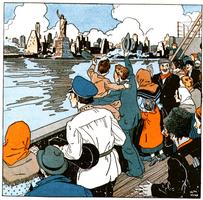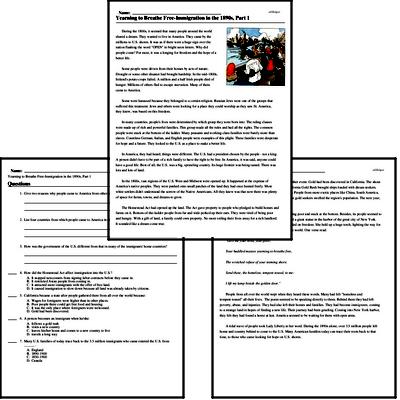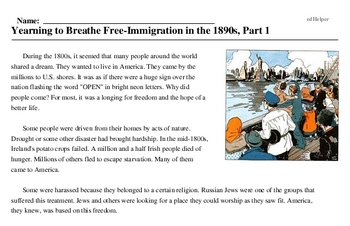Yearning to Breathe Free-Immigration in the 1890s, Part 1
During the 1800s, it seemed that many people around the world shared a dream. They wanted to live in America. They came by the millions to U.S. shores. It was as if there were a huge sign over the nation flashing the word "OPEN" in bright neon letters. Why did people come? For most, it was a longing for freedom and the hope of a better life.
Some people were driven from their homes by acts of nature. Drought or some other disaster had brought hardship. In the mid-1800s, Ireland's potato crops failed. A million and a half Irish people died of hunger. Millions of others fled to escape starvation. Many of them came to America.
Some were harassed because they belonged to a certain religion. Russian Jews were one of the groups that suffered this treatment. Jews and others were looking for a place they could worship as they saw fit. America, they knew, was based on this freedom.
In many countries, people's lives were determined by which group they were born into. The ruling classes were made up of rich and powerful families. This group made all the rules and had all the rights. The common people were stuck at the bottom of the ladder. Many peasants and working-class families were barely more than slaves. Countless German, Italian, and English people were examples of this plight. These families were desperate for hope and a future. They looked to the U.S. as a place to make a better life.
In America, they had heard, things were different. The U.S. had a president chosen by the people - not a king. A person didn't have to be part of a rich family to have the right to be free. In America, it was said, anyone could have a good life. Best of all, the U.S. was a big, sprawling country. Its huge frontier was being tamed. There was lots and lots of land.
In the 1800s, vast regions of the U.S. West and Midwest were opened up. It happened at the expense of America's native peoples. They were pushed onto small patches of the land they had once hunted freely. Most white settlers didn't understand the sorrow of the Native Americans. All they knew was that now there was plenty of space for farms, towns, and dreams to grow.
The Homestead Act had opened up the land. The Act gave property to people who pledged to build homes and farms on it. Bottom-of-the-ladder people from far and wide perked up their ears. They were tired of being poor and hungry. With a gift of land, a family could own property. No more toiling their lives away for a rich landlord. It sounded like a dream come true.
In 1849, people were drawn to America by another event. Gold had been discovered in California. The shout of "Eureka!" was heard around the world. The California Gold Rush brought ships loaded with dream seekers. Some left Europe to try their luck in the gold fields. People from more exotic places like China, South America, and Australia also came, hoping to strike it rich. The gold seekers swelled the region's population. The next year, California was granted statehood.
For the hopeless, America was a way out of being poor and stuck at the bottom. Besides, its people seemed to welcome newcomers. In 1886, they had even placed a giant statue in the harbor of the great city of New York. The majestic lady was the symbol of a nation founded on freedom. She held up a huge torch, lighting the way for travelers. She was said to be speaking a poem to the world. One verse read:



